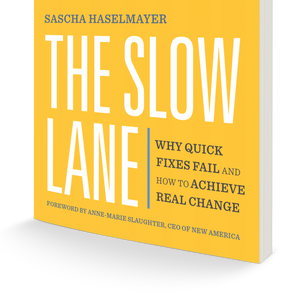“We tend to formulate our problems in such a way as to make it seem that the solutions to those problems demand precisely what we already happen to have at hand.”
Abraham Kaplan, Library Quarterly, 1964
“If all you have is a hammer, everything looks like a nail.”
Abraham Maslov, The Psychology of Science, 1966
Abraham Kaplan and Abraham Maslov were concerned that scientists, charged with the pursuit of truth, tailor their questions to fit their abilities to answer them. The Fast Lane goes a step further still: In its pursuit for dominance, it wants its quick fixes to become the solution for all problems. So, when it comes to the hammer and the nail, the Fast Lane would say, “My hammer is the answer to everything!”
The Fast Lane would say, “My hammer is the answer to everything!”
Power = Bending The World To Fit Your Answer
The Fast Lane way of solving problems and creating change is to lock into one answer, and stick to it. A brilliant leader, in this logic, is one who knew the right answer from the start. And once the Fast Lane gets invested in a solution, it has to insist that nothing else can work. Since people find change tedious, it only feels natural to operate in this way. That’s especially true, if you need to show a return on your investment by growing your market share, or by taking credit for your actions. The Fast Lane winds up using all the powers at its disposal to prove it is right. And since people with considerable power are in charge, they have a lot of means at their disposal to do just that. Businesses leaders, for example, can buy up competitors to stay on top, or lobby governments to get favorable regulations to secure their dominance. Soon, it no longer matters whether these answers are right, or that they only help a small group of people. A successful Fast Lane leader can bend the world to fit their answer.
The Fast Lane ends up using all the powers at its disposal to prove it is right. And since people with considerable power are in charge, they have a lot of means at their disposal to do just that.
Curiosity Kills The Quick-Fix-Tyrant
The Slow Lane does things differently. Here, movements succeed by nurturing their curiosity, in a constant quest to find better answers. They keep their options open. Built for Zero doesn’t prescribe any one way for community leaders to solve homelessness. Instead, it encourages local leaders to find out what works best for them. What Built for Zero does insist on, is that leaders get great at counting and understanding the people who experience homelessness. This kind of flexibility makes it much easier for local leaders to buy into Built for Zero, and become co-creators of the solutions. They feel empowered, and not imposed on. It also helps Built for Zero respond to changing circumstances and individual needs, and stay open to new ideas and insights.
To nurture curiosity, the Slow Lane encourages learning and experimentation. It seeks inspiration from the outside, learning from science, arts or other movements. Not locked into just one answer, they remain open and inviting to others. Think about it: Would you rather join a group that demands that you submit to their ideology, or one that invites you to come as your full self and make a contribution? The German Green Party institutionalized this. The path to the top is always open, for any member. And the rare disease movement in Romania invites doctors, nurses, journalists, and government ministries into the movement. They don’t have to opt into a fixed solution, but can play their part in empowering patients.
Think about it: Would you rather join a group that demands that you submit to their ideology, or one that invites you to come as your full self and make a contribution?
In The Slow Lane (pre-order now!), I have written a chapter on nurturing curiosity, that follows three stories that are dear and personal to me. As a social entrepreneur, I have suffered through countless setbacks and the full set of emotions that these entail. And in the first story, “Meet the Zombies”, we will start with just such an experience, by returning to Mark Johnson and User Voice. We will dive into the pain of rejection they experienced, to shine a light on a choice we have: Should we feed on our prejudice and frustration to pin blame on the government, or could we approach a setback with curiosity to uncover something deeper? Opting for curiosity, we discover the zombies, big bureaucratic systems that have lost all direction. In further pursuit of zombies, my second story, “Fifty Years Late for Everything”, follows the evidence of why Chicago’s street crossings are so unwelcoming to people with visual impairments. It leads us to a zombie system that could have prevented this from happening: city procurement. And in my last story, we go to “Flipping a Zombie? Delightful Bureaucracy”, where we follow my journey to turn city government procurement into a force for real change, by using some unconventional sources of inspiration along the way.
Curiosity, practiced in this way, helps us retain the flexibility to find common ground, instead of getting caught up on a single solution.
Curiosity, in the Slow Lane, works in four ways.
- If we can unlearn our preconceptions, curiosity can help us see past frustration and prejudice to reveal the zombies, the real underlying problems. This kind of unlearning lets us change our perspective.
- We can use this openness to build new bridges that activate people in power, to become our new allies.
- Curiosity owns what is broken, meaning that we take responsibility even for problems that aren’t ours. Nurturing curiosity in this way lets us look beyond traditional answers, and tap into new forms of inspiration. It can also give outsiders permission to get involved.
- Curiosity, lets us walk in on our bureaucracies or other systems to change things. As we arrive at these unexpected places, we should feel proud of being imposters, helping to reimagine and fix what is broken.
What is so special about the Slow Lane, is that by sharing the agency it creates the space for everyone to contribute to a new emerging vision for change. Curiosity, practiced in this way, helps us retain the flexibility to find common ground, instead of getting caught up on a single solution.



